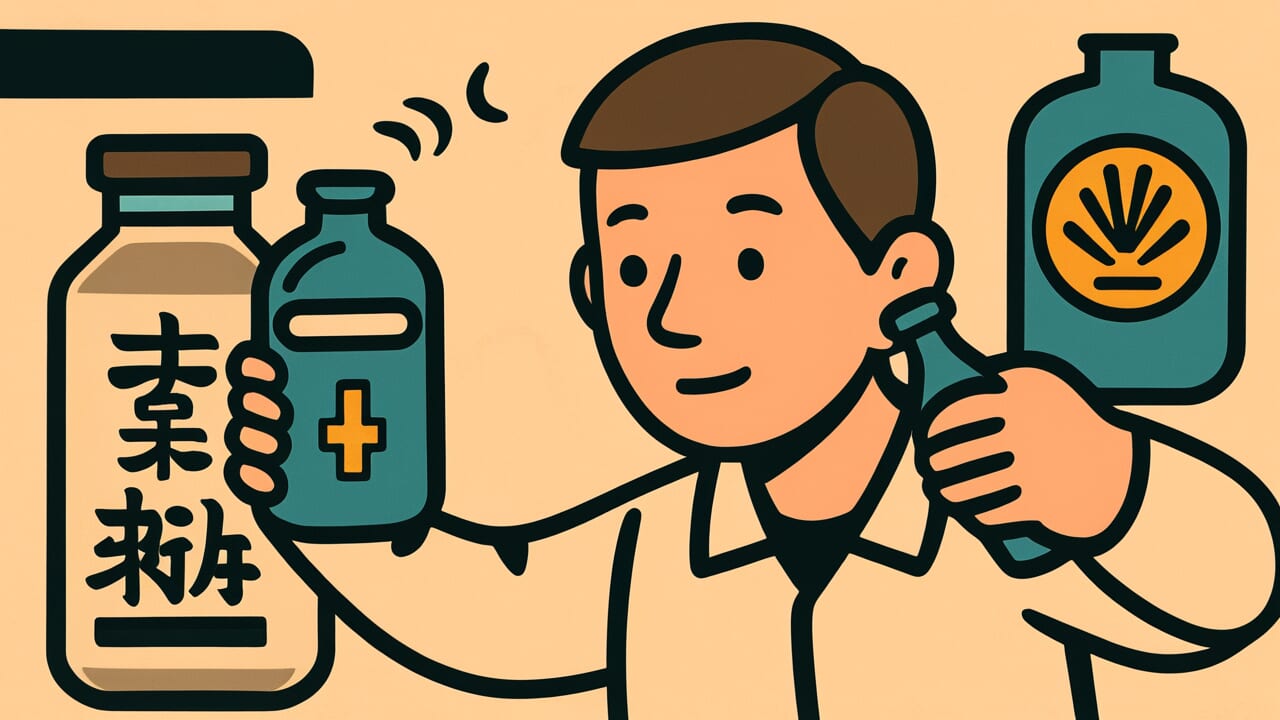How to Read “Moderation is the best medicine”
せっせいはさいりょうのくすり
Meaning of “Moderation is the best medicine”
This proverb means that keeping balance in all areas of life is the most effective way to stay healthy.
This includes eating, drinking, sleeping, and entertainment. Avoiding excess in these areas prevents illness better than relying on medicine after getting sick.
People use this saying when warning against overeating or drinking too much. It also works when advising someone to fix irregular lifestyle habits.
Teachers and doctors use it to explain the basics of health management.
The proverb uses medicine as a clear metaphor. It shows that daily moderation is the most reliable method with no side effects.
Today, people understand it in the context of preventing lifestyle diseases. It suggests that daily moderation is wiser than expensive medical treatment later.
Origin and Etymology
This proverb likely came from translating Western sayings into Japanese. In English, it appears as “Temperance is the best medicine.”
In Latin, the phrase is “Temperantia est optima medicina.” This wisdom has been passed down since ancient times.
Since the time of Hippocrates, called the father of Western medicine, moderation has been considered fundamental to health.
Ancient Greek and Roman medical texts repeatedly stressed the importance of avoiding excessive eating and drinking. They emphasized getting proper exercise and rest.
The idea that preventing illness through moderate living is wiser than taking medicine after getting sick connects to Eastern medicine too. It matches the concept of “treating未病” or pre-illness conditions.
These Western sayings probably entered Japan after the Meiji period along with Western medical knowledge.
The word “moderation” itself was already familiar to Japanese people as a Buddhist term. It meant restraining desires and being careful in conduct.
This familiarity helped the Western saying take root in Japanese. The teaching that health is the greatest treasure has been accepted as universal wisdom.
It reminds us that protecting health comes not from expensive medicine but from daily careful living. This truth crosses time and culture.
Usage Examples
- I’ve been feeling better lately, probably because I stopped staying up late and started practicing “Moderation is the best medicine”
- After my doctor warned me about my lifestyle habits, I really understood the meaning of “Moderation is the best medicine”
Universal Wisdom
“Moderation is the best medicine” speaks to a fundamental truth about human nature. We prioritize immediate pleasure over long-term health.
The delicious meal in front of us, one more drink, just a bit more gaming or staying up late. We know these things aren’t good for us.
But resisting that momentary satisfaction is surprisingly difficult.
This proverb has been passed down for hundreds of years because humanity has always faced this struggle.
At ancient Roman feasts, at Edo period banquets, at modern convenience stores late at night, people fight the same temptations.
Many people later regret not showing more moderation.
What’s interesting is that the proverb says moderation itself is medicine. It’s not presented as endurance or hardship, but as an active form of treatment.
This shows a deep understanding of human psychology. People find it easier to continue behavior when they think “I’m doing something good for my body” rather than “I must not do this.”
Our ancestors positioned moderation as a positive action. This wisdom helps people maintain healthy lifestyles more easily.
When AI Hears This
We tend to think “harmful things should be avoided completely.” But biological bodies show much more complex responses.
The hormesis effect shows that substances harmful in high doses can actually activate the body in low doses.
For example, alcohol in red wine destroys the liver in large amounts. But multiple studies confirm that moderate amounts reduce heart disease risk.
The key to this mechanism is “stress response.” When the body receives slight damage, cells judge that “a stronger attack might come next.”
They strengthen repair functions and defense systems beyond normal levels. In other words, small amounts of poison work like vaccinations.
Muscle soreness from exercise follows the same principle. Muscles grow thicker as microscopic damage to muscle fibers gets repaired.
What’s fascinating is that this effect always has a boundary line called “appropriate amount.”
Radiation research shows that groups receiving tiny amounts of radiation have lower cancer rates than groups with zero exposure. But beyond a certain amount, it becomes harmful.
Fasting once a week activates cellular autophagy. But continuing long-term causes malnutrition.
Moderation isn’t actually “making something completely zero.” It’s “identifying the boundary line where something becomes poison or medicine.”
Life gets strengthened by appropriate stimulation. In overprotective environments, it actually becomes weaker. This is what biology teaches us about moderation.
Lessons for Today
This proverb teaches modern people that health isn’t built in a day, nor does it collapse in a day.
We tend to postpone things saying “I’ll start tomorrow.” But today’s meal and tonight’s hour of sleep are creating your future self.
Modern society overflows with temptations. Convenience stores open 24 hours, video streaming available anytime, easy food delivery.
Convenience is wonderful, but it also makes moderation harder. Perhaps this increases the value of this proverb.
Moderation doesn’t mean denying yourself everything. It means having the mental space to enjoy pleasures while being satisfied with “enough.”
If you enjoy alcohol, drink moderate amounts. If you eat delicious food, stop at 80% full. If you stay up late, do it only once a week.
These small choices accumulate and greatly change your quality of life.
Before buying expensive supplements or the latest health equipment, why not review your daily life first?
The best medicine called moderation is available for free starting today, with just your willpower.



Comments